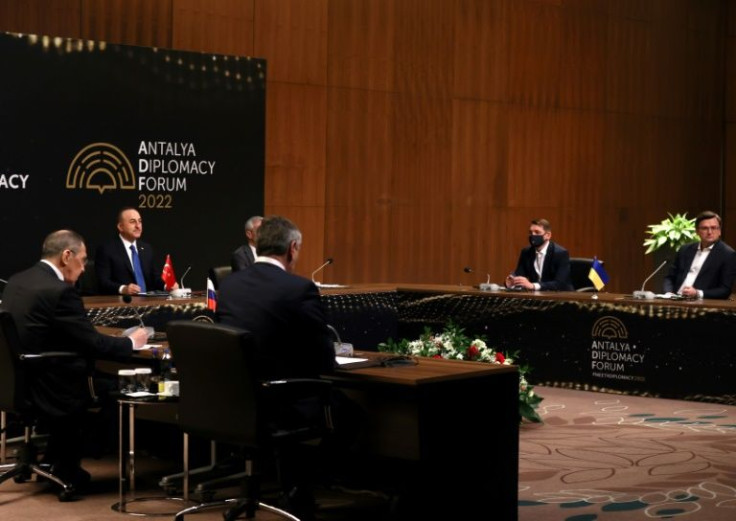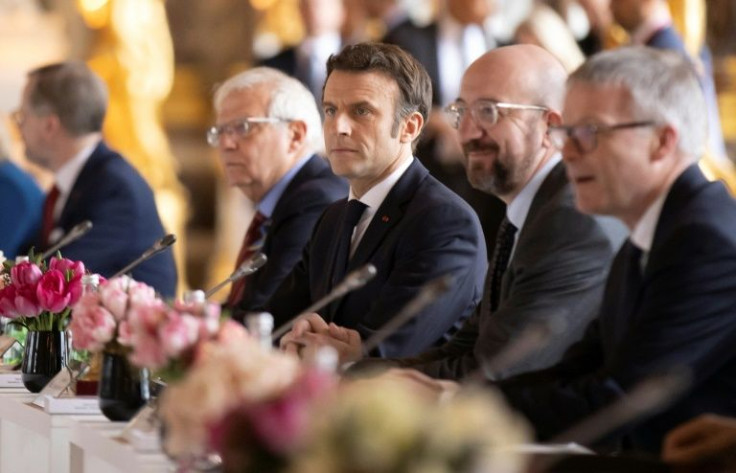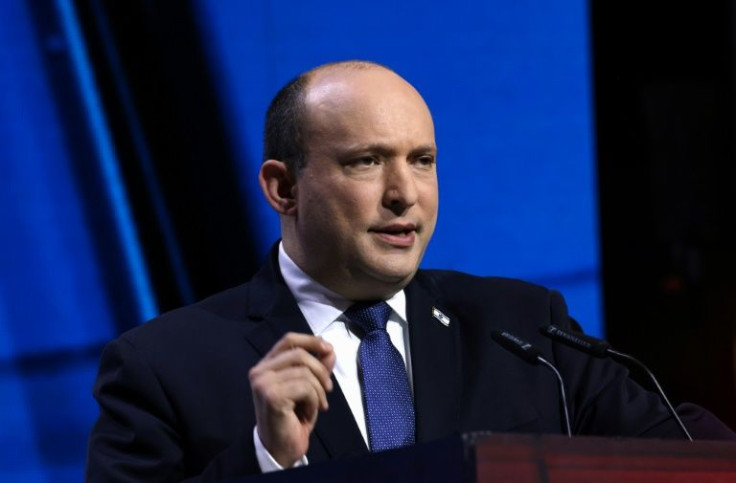Powers Vie For Ukraine Role But No 'Miracle' In Sight
Powers are jostling to play the lead role in finding a diplomatic solution to Russia's war in Ukraine but such attempts risk being a sideshow unless President Vladimir Putin shows genuine interest in a negotiated settlement.
Turkey on Thursday hosted the first talks between the Russian and Ukrainian foreign ministers since the invasion, in an eagerly-awaited encounter Ankara hopes will show its potential as a mediator.
And Israeli Prime Minister Naftali Bennett travelled to Moscow last Saturday for face-to-face talks with Putin, in a hugely symbolic gesture on the Jewish Sabbath.

French President Emmanuel Macron has meanwhile clocked up several hours on the phone with Putin since the invasion began to keep channels of communication open, even in the darkest times.
"The meeting was an important start. No one should expect miracles at one meeting," Turkish Foreign Minister Mevlut Cavusoglu said after the meeting between his Russian and Ukrainian counterparts which he acknowledged was "not easy".
Yet analysts say that for now Putin appears intent on pushing the offensive deep into Ukraine with the aim of taking Kyiv, despite agreement among Western observers that the invasion has progressed more slowly than Moscow hoped.
Only if Ukraine's resistance held up the Russian forces even longer, inflicting heavy losses, with Western sanctions crippling the Russian economy, would Putin start to take talks seriously.

"It's very good that Turkey and Israel are trying, but I don't see it as fundamentally important," said Marc Pierini, a visiting scholar at Carnegie Europe.

"I don't believe that a peace solution would go through Turkey or Israel because Putin's showdown is with (US President Joe) Biden and NATO, and I'm not sure he wants a way out of the crisis."
"At the end of the day, the real questions that matter are how far the Russian steamroller can continue to advance in Ukraine, and the extent of the sanctions," he said.
Observers believe Russia has sustained considerable human and equipment losses in the last two weeks. A call by Russia for fighters from Syria to join the battle is a sign that greater numbers are needed.
"If Ukrainian forces continue to attrit the Russian military at the current rate, Putin will have to start looking for a viable exit strategy," Gustav Gressel, senior policy fellow at the European Council on Foreign Relations, wrote this week.

A senior French security source, who asked not to be named, said this week that it was "not to be excluded" that a diplomatic solution could be on the table.
Putin said on Friday there had been some "positive shifts" in talks between Russia and Ukraine, whose officials have also been meeting in Belarus.
Turkey has a complex relationship with Russia. The two countries are longstanding rivals and have been on opposing sides of the conflicts in Libya and Syria.
But President Recep Tayyip Erdogan has forged a close alliance with Putin in recent years that has sometimes discomforted fellow NATO members.
Turkey's ambassador to France Ali Onaner told AFP: "Contrary to the cliche of a marriage of convenience between Russia and Turkey, we are the only NATO member who has been able to show Russia its limits in Libya and Syria."
He said Turkey had amassed "the greatest experience" in dealing with difficult questions with Russia during years of sometimes tense talks over the Syria crisis.
Israel also touts a specific political advantage, with an Israeli diplomatic source saying the country is the "the only actor who is able to talk directly to Russia and Ukraine, and with Western countries such as France or Germany."
Their overtures also come with Israel and Turkey in the throes of a bilateral rapprochement after years of tense ties, with President Isaac Herzog visiting this week for talks with Erdogan.
Pierre Razoux, academic director of the French army's Institute for Strategic Research, said the conflict was deeply uncomfortable for Turkey and Israel as each wants a good relationship with both Kyiv and Moscow.
"They feel obliged to condemn Russia's offensive but also want to show they are ready to talk" to Moscow, he said.
"All these channels are useful but I don't think it will lead to anything," Razoux added.
Macron, who French officials say is still using the informal 'you' in talks with Putin, has vowed to carry on talking with the Russian leader even if the prospects are unclear.
"We need to remain engaged in a dialogue to obtain a solution," Macron said on Thursday, warning that "I do not see a diplomatic solution in the next hours or days"
© Copyright AFP 2025. All rights reserved.





















